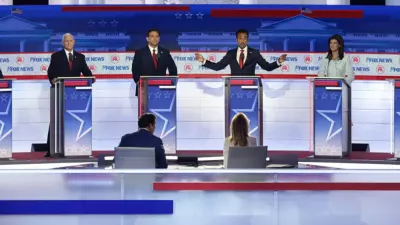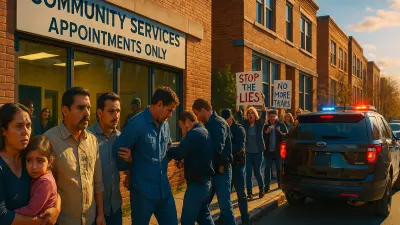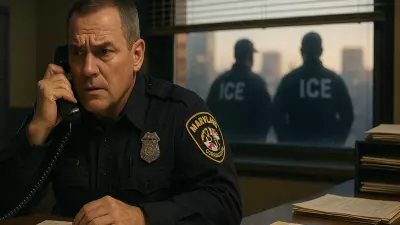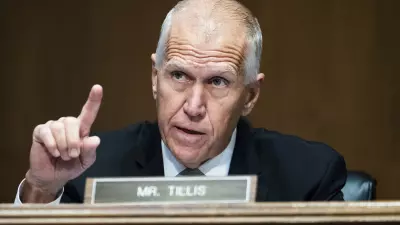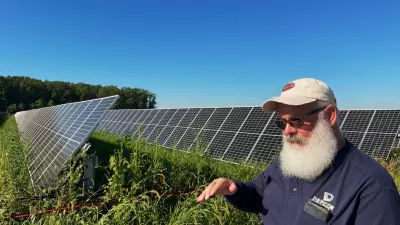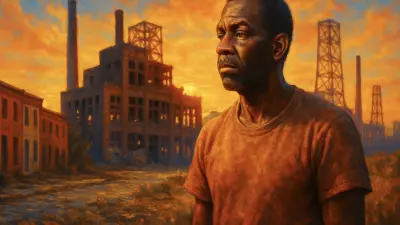Eight Republican presidential candidates gathered onstage in Milwaukee, Wisconsin, for a heated first primary debate heavily influenced by former President Donald Trump, though the party’s front runner refused to attend the two-hour event.

Trump instead recorded a competing 46-minute interview with former Fox News personality Tucker Carlson that aired on X, formerly known as Twitter, posted minutes before the debate began. Trump throughout the interview insulted President Joe Biden’s health and mental capacity, mocked his fellow Republican candidates and repeated his unfounded claim that the 2020 election was stolen from him.
With just five months before voters head to the first-in-the-nation GOP caucuses in Iowa, each of the eight Republicans who qualified for the debate sponsored by conservative broadcaster Fox News tried to convince viewers they are the best politician to defeat Biden in the 2024 election.
Attending the GOP debate were North Dakota Gov. Doug Burgum, former New Jersey Gov. Chris Christie, Florida Gov. Ron DeSantis, former South Carolina Gov. Nikki Haley, former Arkansas Gov. Asa Hutchinson, former Vice President Mike Pence, entrepreneur Vivek Ramaswamy and South Carolina Sen. Tim Scott.
A handful of the candidates criticized Trump, who faces criminal indictments in four cases and is expected to report to the Fulton County Jail in Georgia on Thursday for a voluntary surrender in a case centering on interference in the 2020 election.
All the candidates but Hutchinson and Christie raised their hand to indicate they would still support Trump if he were convicted of any of the four criminal prosecutions he faces. Ramaswamy said he would pardon Trump on his first day in office.
Abortion policy
In one of the more contentious exchanges, the Republican candidates — who all consider themselves “pro-life” — differed over whether a GOP president should press for a nationwide ban on abortion access, likely to be a major issue in the 2024 election following the Supreme Court ruling striking down Roe v. Wade.
Haley said the candidates need to be honest with Americans that it’s unlikely a majority of U.S. House members and at least 60 U.S. senators would vote to pass a nationwide ban.
If elected, Haley said, she would look for consensus to prevent abortions late in a pregnancy, encourage adoptions, protect doctors and nurses who don’t believe they should have to perform abortions, ensure contraception is available and make sure women don’t go to jail if they choose to end a pregnancy.
“Let’s treat this like the respectful issue that it is and humanize the situation and stop demonizing the situation,” Haley said.
Pence rejected that assertion, arguing that “consensus is the opposite of leadership.”
The former vice president said he would press for a nationwide ban on abortion access after 15 weeks.
“When the Supreme Court returned this question to the American people, they didn’t just send it to the states only. It’s not a states-only issue. It’s a moral issue,” Pence said. “And I promise you, as president of the United States, the American people will have a champion for life.”
Scott also advocated for a nationwide ban of at least 15 weeks, saying Democratic states should not be able to set their own abortion laws.
“We cannot let states like California, New York, Illinois have abortions on demand up until the day of birth. That is immoral. It is unethical. It is wrong,” Scott said. “We must have a president of the United States who will advocate and fight for at the minimum a 15-week limit.”
DeSantis was somewhat less clear than the other candidates, saying he believes in a “culture of life” and was proud to sign a six-week ban as Florida governor, though he didn’t say what he would press for if elected president.
“Look, I understand Wisconsin is going to do it different than Texas. I understand Iowa and New Hampshire are going to do different. But I will support the cause of life as governor and as president,” DeSantis said.
There were approximately 930,160 abortions in the United States during 2020, according to the Guttmacher Institute. The majority of the abortions within the country are now done through medication abortion, a two-dose regimen that is approved for up to 10 weeks gestation.
About 93% of abortions take place during the first trimester, defined as at or before 13 weeks of gestation. Another 6% take place between 14 and 20 weeks and about 1% of abortions take place at 21 weeks or later in a pregnancy, according to the Centers for Disease Control and Prevention.
Minnesota Democratic Sen. Tina Smith said on a press call hosted by the Biden-Harris campaign on Tuesday in advance of the event that the Republican debate would “make really clear what Americans already know, which is that none of the Republican candidates for president will protect access to health care, including abortion.”
“These candidates are completely out of touch with American voters who strongly support abortion rights,” Smith said.
Susan B. Anthony Pro-Life America has called on all of the Republican candidates to commit to pressing for a nationwide ban on abortions after 15 weeks gestation, while other conservative organizations have pressed for a nationwide abortion ban earlier in pregnancy.
Biden blamed for economic problems
Before the first question of the night, Fox News played a montage of voters complaining about rising prices.
Year-over-year inflation reached its highest point in two decades under Biden, at 9.1% in June 2022, according to the U.S. Bureau of Labor Statistics. That dropped to 3.2% last month, much closer to the Federal Reserve’s target of 2%.
In Trump’s absence, the first question of the night went to the candidate leading in the polls behind Trump, DeSantis, who said the nation was in decline under Biden. He called for opening more energy production as a way to boost the economy.
Christie said he and others on the stage “predominantly” agreed with DeSantis’ answer on the economy, but said he had the strongest leadership experience that would be required.
The other candidates largely used their first round of speaking to criticize the economy under Biden.
The Republicans sought to present themselves as the most conservative option on spending and taxes, describing Biden and congressional Democrats as irresponsible free spenders.
But Haley said Democrats weren’t the only ones to blame, noting the $2.2 trillion COVID-19 relief law was passed on a bipartisan basis and signed by Trump. She also said Republicans asked for three times as much money in federal earmarks this year.
“So you tell me who are the big spenders,” she said. “I think it’s time for an accountant in the White House.”
She criticized Scott, DeSantis and Pence for voting to raise the debt limit.
Scott said his votes to approve large spending packages under Trump were a response to the COVID-19 pandemic.
Three candidates — DeSantis, Ramaswamy and Burgum — specifically named Biden’s energy policies as a hurdle to economic growth.
“We will be energy-dominant again,” DeSantis said, borrowing a favorite phrase of Trump.
Climate change
The second topic of the night, perhaps a surprise to Republican primary voters, was about climate change. A Catholic University of America student asked how the candidates would soothe young voters concerned about climate change.
Moderators Brett Baier and Martha MacCallum sought to have candidates raise their hands if they agreed human activity was causing climate change. Hutchinson appeared ready to raise his hand when DeSantis shut down the exercise.
“Look, we’re not schoolchildren, let’s have the debate,” he said. “I’m happy to take it to start.”
He did not substantively answer the question, instead criticizing Biden’s response to the recent wildfires on Maui and complaining about media coverage.
Ramaswamy was the most clear on the issue, though he took the opposite position to even most Republican voters.
“The climate change agenda is a hoax,” he said. “The anti-carbon agenda is the wet blanket on our economy.”
Haley and Scott both nodded to environmental protection but declined to advocate for reducing domestic carbon emissions. Instead, they said, the U.S. should focus on forcing developing countries to reduce theirs.
“Is climate change real? Yes it is,” Haley said. “But if you want to go and really change the environment, then we need to start telling China and India that they have to lower their emissions.”
Average global temperatures in July set a new mark for the hottest month on record, coming after the hottest June ever recorded. This year is likely to be the hottest year since record keeping began in the 1880. The last nine years are all among the nine hottest ever, according to the National Centers for Environmental Information,
Majorities of voters in both parties now say human activity is causing a warming climate, but still differ on whether those rising temperatures are primary factors in dangerous weather events — such as wildfires, floods, drought and severe storms — according to a Washington Post-University of Maryland poll published Wednesday.
“Climate change is real, by the way,” Biden tweeted during the exchange.
Divided on Ukraine aid
One of the starkest dividing lines Wednesday was on aid to Ukraine, with Ramaswamy and DeSantis saying the U.S. should not send more funding to the country defending a Russian invasion.
Ramaswamy’s position in particular seemed to rankle Pence and Haley, who have longer foreign policy resumes.
Ramaswamy said Haley could look forward to board positions with defense contracting companies.
“You have no foreign policy experience, and it shows,” Haley shot back. “It shows.”
The U.S. has sent $110 billion to Ukraine since Russian President Vladimir Putin sent troops into that country last year. Biden asked Congress to approve $24 billion more as part of a supplemental funding request this month that also called for additional funds for disaster relief and border security.
Wisconsin setting
The debate took place at Fiserv Forum, the home arena of the Milwaukee Bucks basketball team. Located downtown, the forum can seat more than 17,000 people for concerts and sporting events. Since the arena opened in 2018, it has hosted performers such as Elton John, Lizzo, Harry Styles and Bon Jovi.
Biden narrowly won Wisconsin during the 2020 general election with 49.5% of the vote compared to Trump’s 48.8%. The two were separated by fewer than 20,700 votes. During his interview with Carlson, Trump claimed to have won Wisconsin.
Biden said Wednesday afternoon during a family trip to Lake Tahoe, Nevada, that he planned to watch as much of the Republican primary debate as he could, though when asked about his expectations, he laughed and said, “I have none.”
Trump defends Jan. 6
Trump in his interview with Carlson hinted at armed conflict and lobbed insults at his GOP rivals and Biden. Trump also presented an alternate version of history about the attack on the U.S. Capitol on Jan. 6, 2021, saying the crowd was filled with “love and unity.” Trump has been indicted in connection with his activities that led to the day’s events.
“People in that crowd said it was the most beautiful day they’ve ever experienced,” he said. “There was love in that crowd. There was love, and unity. I have never seen such spirit, and such passion, and such love, and I’ve also never seen, simultaneously and from the same people, such hatred of what they’ve done to our country.”
Carlson said Trump has been impeached and indicted and asked him, “Don’t they have to kill you now?” And asked by Carlson if open conflict was possible in the future, Trump said he didn’t know.
“I can say this, there’s a level of passion that I’ve never seen, there’s a level of hatred that I’ve never seen, and that’s probably a bad combination.”
Candidates pledge to support a convicted Trump
On the debate stage, the moderators asked the candidates to raise their hands if they would still support Trump’s candidacy if he is convicted.
Ramaswamy’s hand went up first, followed quickly by Haley, Scott and Burgum, then DeSantis and Pence.
Christie and Hutchinson indicated they would not support Trump if he’s convicted.
“Someone’s got to stop normalizing this conduct,” Christie said. “Whether or not you believe the criminal charges are right or wrong, the conduct is beneath the office of president of the United States.”
The crowd reacted with a mix of boos and cheers.
Ramaswamy called Trump the best president of the century and said Christie’s “entire campaign” was “based on vengeance and grievance against one man,” Trump. Ramaswamy dismissed the federal prosecutions of Trump as political.
Christie responded that Ramaswamy’s approach was hypocritical because the 38-year-old entrepreneur said he supported law and order.
“You make me laugh,” Christie said, prompting prolonged boos from the audience.
Candidates left on the sidelines
Several GOP presidential hopefuls didn’t qualify for the debate, including former Texas Rep. Will Hurd and Miami Mayor Francis Suarez.
Hurd criticized the Republican National Committee’s debate criteria, saying a “the lack of transparency and confusion around the RNC’s debate requirements is antithetical to the democratic process.”
“I have said from day one of my candidacy that I will not sign a blood oath to Donald Trump,” Hurd said in a statement. “The biggest difference between me and every single candidate who will be on the debate stage in Milwaukee is that I have never bent the knee to Trump.”
The RNC required candidates to sign a pledge committing to support the official Republican nominee in the general election as one of the benchmarks for participating in the debate. Trump said in early August he would not sign the pledge.
Suarez said in a statement he was “sorry that this debate will not include my perspectives from the largest growing voting block in our country — young, conservative Hispanics.”
The Miami mayor said earlier this month that any candidates who didn’t make the debate stage should drop out, though he didn’t withdraw his candidacy after he failed to make the stage.
The second Republican presidential primary debate will be Sept. 27 in Simi Valley, California, at the Ronald Reagan Presidential Library.
Jacob Fischler covers federal policy as a senior reporter for States Newsroom. Based in Oregon, he focuses on Western issues. His coverage areas include climate, energy development, public lands and infrastructure.
Jennifer Shutt covers the nation’s capital as a senior reporter for States Newsroom. Her coverage areas include congressional policy, politics and legal challenges with a focus on health care, unemployment, housing and aid to families.
Samantha Dietel is a reporter intern in Washington, D.C. She is pursuing a degree in journalism at the University of Missouri-Columbia. She has previously covered the Missouri legislature in Jefferson City as a reporter for the Columbia Missourian.
The Wisconsin Examiner is a nonpartisan, nonprofit news site offering a fresh perspective on politics and policy. As the largest news bureau covering state government in Madison, the Examiner offers investigative reporting and daily coverage dedicated to the public interest. We take our inspiration from the motto emblazoned on a ceiling in our state Capitol: “The Will of the People Is the Law of the Land.”

